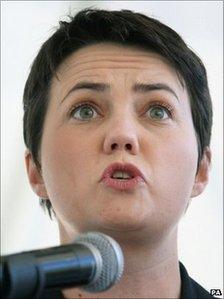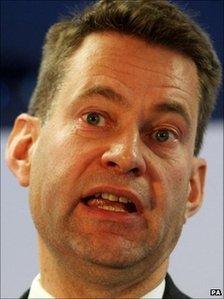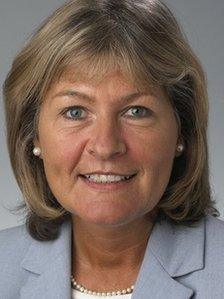Scottish Conservative leadership contenders
- Published
The Scottish Conservatives are looking for a new leader after Annabel Goldie decided to step down from the post in the wake of the party's poor performance at the last UK and Scottish elections.
As the Scottish government's referendum approaches, the Scottish Conservatives are now fighting their own battle for independence, over whether the party should carry on as it is or disband in favour of a new, right-of-centre political group.
Here is a look at the contenders for the leadership of the party:
Jackson Carlaw
Key backers: Mary Scanlon MSP
Jackson Carlaw may lack some of the high-profile backers to have come out for his rivals, but he hopes his long record of service in the party will speak for itself.

Jackson Carlaw has called for an early referendum on independence
Like Mr Fraser, Mr Carlaw has been involved with the party since he was a teenager, serving in youth politics as chairman of the Scottish Young Conservatives, a constituency chairman and area officer and, latterly MSP for the West of Scotland.
But unlike Mr Fraser, Mr Carlaw, who has had his eye on the Scottish Conservative leadership for some time, strongly opposes a breakaway party.
Mr Carlaw was appointed deputy chairman of the Scottish Conservatives by the prime minister after the 1992 election - a position he held until 1998.
Although he has opposed full fiscal autonomy for Holyrood, he wants reforms to the Scottish Parliament including sitting for longer, while stating that First Minister's questions has become "a quite ghastly mis-advertisement for the Scottish Parliament".
Mr Carlaw says the real problem with the Scottish Conservatives is that they fails to say what they stand for, and points to the Welsh party, which he says recovered its fortunes not through a name change but by re-asserting its identity.
In a reference to the famous Margaret Thatcher line, Mr Carlaw, who has even launched an online petition to keep the Scottish Tories as they are, declared: "You disband if you want to, the party's not for disbanding."
Elsewhere, the businessman has called for an early referendum on independence - a resurfacing of Wendy Alexander's "bring it on" policy - and has also backed minimum drink pricing, which is opposed by his party.
He also hopes a new "act of constitutional settlement" will put to bed the reviews of devolution which crop up every few years - an exercise known to make unionists nervous when it comes to the independence question.
Ruth Davidson
Key backers: Lord Sanderson, Lord Strathclyde, leader of the House of Lords, John Scott MSP, and deputy Holyrood presiding officer, John Lamont MSP, Murray Tosh, Lord Forsyth, Michael Ancram.

Ruth Davidson argues that real change only comes from asking people what matters to them
As a 32-year-old, newly elected, openly gay Tory MSP, Ruth Davidson has been described as the fresh-faced, new generation of the Scottish Conservative Party.
But can looks be deceiving?
When compared to Murdo Fraser's radical plans for the party, Ms Davidson almost seems more of a status quo candidate.
Not only does the former BBC journalist oppose further new powers for Holyrood, describing those to be delivered through the Scotland Bill as "a line in the sand", but she has mounted a vigorous campaign against the notion of a new party to replace the Scots Tories.
It was the Ruth Davidson campaign which facilitated a statement by major party donor Sir Jack Harvie, of the Focus on Scotland group, in which he refused to bankroll a breakaway party.
Focus on Scotland has given about £1m to the party in the last few years, making it the Scottish Conservative and Unionist Party's biggest donor.
Ms Davidson, who became a Glasgow list MSP in May, says the leadership campaign has become distracted by the debate over disbanding and rebranding the Scottish Conservatives, arguing that real change only comes from asking people what matters to them, and bringing fresh thinking to important issues, such as health, education and justice.
At a time when increased powers for the Scottish Parliament has become a popular issue, Ms Davidson is hoping party members will want a leader intent to make the best of what Scotland already has.
Murdo Fraser
Key backers: Sir Malcolm Rifkind MP, Jamie McGrigor MSP, Liz Smith MSP, Gavin Brown MSP, Alex Fergusson MSP, Alex Johnstone MSP, Nanette Milne MSP, David McLetchie MSP, Struan Stevenson MEP.

Murdo Fraser wants a right-of-centre progressive party to replace the Scottish Conservatives
As the long-serving deputy leader of the Scottish Conservatives, Murdo Fraser was seen a frontrunner - but has he scared the horses too much with his radical plans?
Essentially, Mr Fraser wants to get rid of the "Scottish Conservatives" - the so-called toxic brand - in favour of a new, right-of-centre progressive party.
He says the Conservatives carry too much baggage in Scotland and splitting from the UK party means they stand a better chance of attracting more voters.
Not only that, but the former UK Young Conservative chairman has taken a very different tack to his opponents when it comes to the constitutional question, currently all the rage in Scottish political debate.
Mr Fraser favours more financial powers for Holyrood, but stops short of backing full fiscal freedom - "independence in disguise", as he puts it.
The former lawyer, who became an MSP in 2001 after a vacancy arose on the mid-Scotland and Fife list, has been seen by colleagues, commentators and others as a skilled debater and politician.
His plans to set up a new party, which would ally itself with the UK Conservatives come election time, has been praised by many.
But while the UK party leadership seems relaxed about the idea, Scotland's sole Tory MP, David Mundell, has his reservations.
Questions still remain, the biggest one being whether the approach will chime with long-serving Tory party members in Scotland when the time comes to vote in a new leader?
Margaret Mitchell
Given Margaret Mitchell only decided to enter the leadership race the day before close of nominations, she has had less time to set out her stall.

Margaret Mitchell is a strong critic of more powers for the Scottish Parliament
However, what has long been clear is the Central Scotland MSP's credentials as an old-school Conservative of the twin-set-and-pearls variety, which may have strong appeal to party members.
Ms Mitchell has gone even further than her party colleagues on Scotland's constitution, by dismissing the setting up of the Calman Commission, which led to the Scotland Bill to increase Holyrood's powers.
In a recent Scottish Parliament debate, she won praise from the SNP - but not her own party - by attacking "navel-gazing" MSPs for devoting time to an issue in which she said voters had little interest.
In contrast to others, the former teacher and justice of the peace argues strongly that constitutional change is not a priority for voters, and she had called for a referendum before more tax powers are given to the parliament.
Ms Mitchell says she launched her campaign after looking at what was on offer from her rivals, saying she offers something different, as the only candidate more concerned about "people", rather than reforms to the party.
The MSP argues there is a finite window of opportunity to make up lost ground and that the Conservatives must get results in the forthcoming council elections as a way to build success at Holyrood and strike a blow to the SNP's independence argument.
Ms Mitchell's leadership rivals were confident she would not secure the required 100 nominations to stand in the contest.
Even if she doesn't emerge as a frontrunner, her campaign's vote-splitting potential will add further interest to the contest and keep her rivals on their toes.